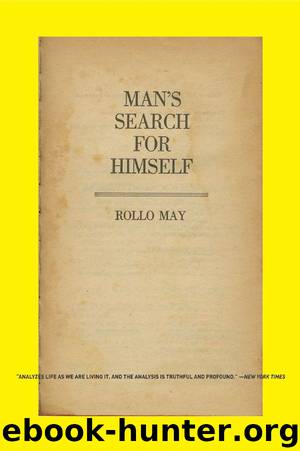Man's Search for Himself by May Rollo

Author:May, Rollo
Language: eng
Format: epub, mobi
Publisher: W. W. Norton & Company
Published: 2009-02-17T16:00:00+00:00
What Freedom Is Not
We can understand more clearly what freedom is if we first look at what it is not. Freedom is not rebellion. Rebellion is a normal interim move toward freedom: it occurs to some extent when the little child is trying to exercise his muscles of independence through the power to say “No”; it occurs more clearly when the adolescent is trying to become independent of parents. In adolescence (as possibly in other stages too) the strength of the rebelliousness against what the parents stand for is often excessive because the young person is fighting his own anxiety at stepping out into the world. When parents say “Don’t” he often must scream defiance at them, because that “don’t” is exactly what he feels the craven side of himself is saying, the side of himself which is tempted to take refuge behind the walls of parental protection.
But rebellion is often confused with freedom itself. It becomes a false port in the storm because it gives the rebel a delusive sense of being really independent. The rebel forgets that rebellion always presupposes an outside structure—of rules, laws, expectations—against which one is rebelling; and one’s security, sense of freedom and strength are dependent actually on this external structure. They are “borrowed,” and can be taken away like a bank loan which can be called in at any moment. Psychologically many persons stop at this stage of rebellion. Their sense of inner moral strength comes only from knowing what moral conventions they do not live up to; they get an oblique sense of conviction by proclaiming their atheism and disbelief.
Much of the psychological vitality of the 1920’s came from rebellion. This is illustrated in the novels of F. Scott Fitzgerald, D. H. Lawrence and to some extent Sinclair Lewis. It is interesting now, when reading F. Scott Fitzgerald’s This Side of Paradise or his other novels which were the bibles of the emancipated young people of his day, to note what a furor is made over kissing a girl, or other actions that now impress us as mere peccadillos. D. H. Lawrence carried on a great crusade in his novel Lady Chatterley’s Lover to proclaim the thesis that Lady Chatterley, whose husband had become paralyzed, had the right to take a lover who happened to be a worker on the estate grounds. A novelist writing that novel today would scarcely find it necessary, so little does sexual freedom now have to be argued, to make the husband paralyzed.
It was not that the ideas were in themselves unworthy of serious discussion—ideas like “free love,” “free expression” in bringing up children, and so on. It is that they were defined negatively, largely in terms of what one was against. We were against external compulsions on love, against rigidly curtailing the free development of children. And the emphasis, if we take the latter example, was on what the parent must not do—he must not interfere, and, in the extreme forms of the doctrine, the child must be allowed to do anything he wishes.
Download
This site does not store any files on its server. We only index and link to content provided by other sites. Please contact the content providers to delete copyright contents if any and email us, we'll remove relevant links or contents immediately.
Rewire Your Anxious Brain by Catherine M. Pittman(18654)
Talking to Strangers by Malcolm Gladwell(13370)
The Art of Thinking Clearly by Rolf Dobelli(10489)
Mindhunter: Inside the FBI's Elite Serial Crime Unit by John E. Douglas & Mark Olshaker(9341)
Becoming Supernatural by Dr. Joe Dispenza(8217)
Change Your Questions, Change Your Life by Marilee Adams(7780)
Nudge - Improving Decisions about Health, Wealth, and Happiness by Thaler Sunstein(7706)
The Road Less Traveled by M. Scott Peck(7603)
The Lost Art of Listening by Michael P. Nichols(7506)
Mastermind: How to Think Like Sherlock Holmes by Maria Konnikova(7347)
Enlightenment Now: The Case for Reason, Science, Humanism, and Progress by Steven Pinker(7313)
Win Bigly by Scott Adams(7197)
The Way of Zen by Alan W. Watts(6614)
Daring Greatly by Brene Brown(6512)
Big Magic: Creative Living Beyond Fear by Elizabeth Gilbert(5771)
Grit by Angela Duckworth(5614)
Ego Is the Enemy by Ryan Holiday(5447)
Men In Love by Nancy Friday(5240)
The Laws of Human Nature by Robert Greene(5208)
